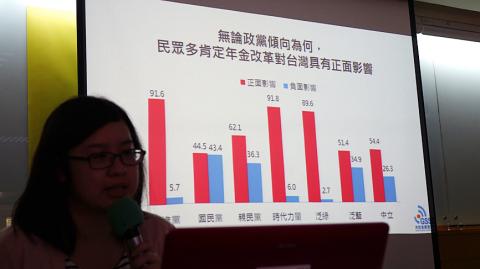President Tsai Ing-wen’s (蔡英文) overall approval rating has rallied to 51.6 percent on the back of the passage of pension reform bills, a poll released yesterday by the Taiwan Style Foundation showed.
The poll found that more than 60 percent of respondents were satisfied with Tsai’s pension reform performance, while her approval rating climbed 4.9 percent from a July 3 survey.
However, her disapproval rating was 40.8 percent, and while 41.4 percent of those polled said they were satisfied with her overall performance — an 8 percentage-point increase from the July 3 poll — 54.3 percent said they were dissatisfied.

Photo: George Tsorng, Taipei Times
The approval rating of Premier Lin Chuan (林全) has also risen, from 28.7 percent on July 3 to 34.7 percent, but his disapproval rating remains high at 57.7 percent, the poll showed.
The Act Governing the Retirement and Pensions of Public-School Teachers and Employees (公立學校教職員退休撫卹條例) passed on June 27 reduced the pension benefits of public-sector employees.
Asked if they were satisfied with the reform, 62.8 percent of respondents said they were, while 31.1 percent said they were not.
The reform would have a positive effect on the nation’s development, 68.1 percent of respondents said, but 21.6 percent said it would have a negative effect.
While 61.9 percent of those polled said pension reform was a major achievement for Tsai, 30.6 percent said it was not.
The poll showed bipartisan support for the act across age groups and regions, suggesting the reform has hit its mark, Democratic Progressive Party (DPP) Legislator Wang Ding-yu (王定宇) said.
“Tsai’s administration has to understand that public support would grow if it does the right thing and explains policies well. However, it would lose both [supporters and opponents of the pension reform] if it makes compromises to curry favor,” Wang said.
Regarding the Forward-looking Infrastructure Development Program, 61.5 percent of respondents said it would benefit the nation, while 27.3 percent said it would not.
While 59.3 percent of respondents supported the government’s introduction of the program, 31.1 percent opposed it.
The Chinese Nationalist Party’s (KMT) obstruction of Lin’s budget report for the program was approved by 26.8 percent of respondents, but disapproved by 60 percent.
The obstruction of legislative proceedings would negatively impact the KMT according to 50.4 percent of the respondents, while 30.2 percent said it would have a positive effect.
On the question of who should run Taipei, 59.5 percent of respondents said the DPP should field its own candidate instead of again backing independent Taipei Mayor Ko Wen-je (柯文哲), while 20.7 percent opposed the idea.
That 72.1 percent of the DPP-inclined respondents wanted the party to pitch its own candidate suggests Ko’s support base is abandoning him, DPP Legislator Chuang Ruei-hsiung (莊瑞雄) said.
The poll was conducted on Sunday and Monday, collected 1,069 valid samples and has a confidence level of 95 percent and a margin of error of 2.99 percentage points.

Alain Robert, known as the "French Spider-Man," praised Alex Honnold as exceptionally well-prepared after the US climber completed a free solo ascent of Taipei 101 yesterday. Robert said Honnold's ascent of the 508m-tall skyscraper in just more than one-and-a-half hours without using safety ropes or equipment was a remarkable achievement. "This is my life," he said in an interview conducted in French, adding that he liked the feeling of being "on the edge of danger." The 63-year-old Frenchman climbed Taipei 101 using ropes in December 2004, taking about four hours to reach the top. On a one-to-10 scale of difficulty, Robert said Taipei 101

A preclearance service to facilitate entry for people traveling to select airports in Japan would be available from Thursday next week to Feb. 25 at Taiwan Taoyuan International Airport, Taoyuan International Airport Corp (TIAC) said on Tuesday. The service was first made available to Taiwanese travelers throughout the winter vacation of 2024 and during the Lunar New Year holiday. In addition to flights to the Japanese cities of Hakodate, Asahikawa, Akita, Sendai, Niigata, Okayama, Takamatsu, Kumamoto and Kagoshima, the service would be available to travelers to Kobe and Oita. The service can be accessed by passengers of 15 flight routes operated by

Taiwanese and US defense groups are collaborating to introduce deployable, semi-autonomous manufacturing systems for drones and components in a boost to the nation’s supply chain resilience. Taiwan’s G-Tech Optroelectronics Corp subsidiary GTOC and the US’ Aerkomm Inc on Friday announced an agreement with fellow US-based Firestorm Lab to adopt the latter’s xCell, a technology featuring 3D printers fitted in 6.1m container units. The systems enable aerial platforms and parts to be produced in high volumes from dispersed nodes capable of rapid redeployment, to minimize the risk of enemy strikes and to meet field requirements, they said. Firestorm chief technology officer Ian Muceus said

MORE FALL: An investigation into one of Xi’s key cronies, part of a broader ‘anti-corruption’ drive, indicates that he might have a deep distrust in the military, an expert said China’s latest military purge underscores systemic risks in its shift from collective leadership to sole rule under Chinese President Xi Jinping (習近平), and could disrupt its chain of command and military capabilities, a national security official said yesterday. If decisionmaking within the Chinese Communist Party has become “irrational” under one-man rule, the Taiwan Strait and the regional situation must be approached with extreme caution, given unforeseen risks, they added. The anonymous official made the remarks as China’s Central Military Commission Vice Chairman Zhang Youxia (張又俠) and Joint Staff Department Chief of Staff Liu Zhenli (劉振立) were reportedly being investigated for suspected “serious